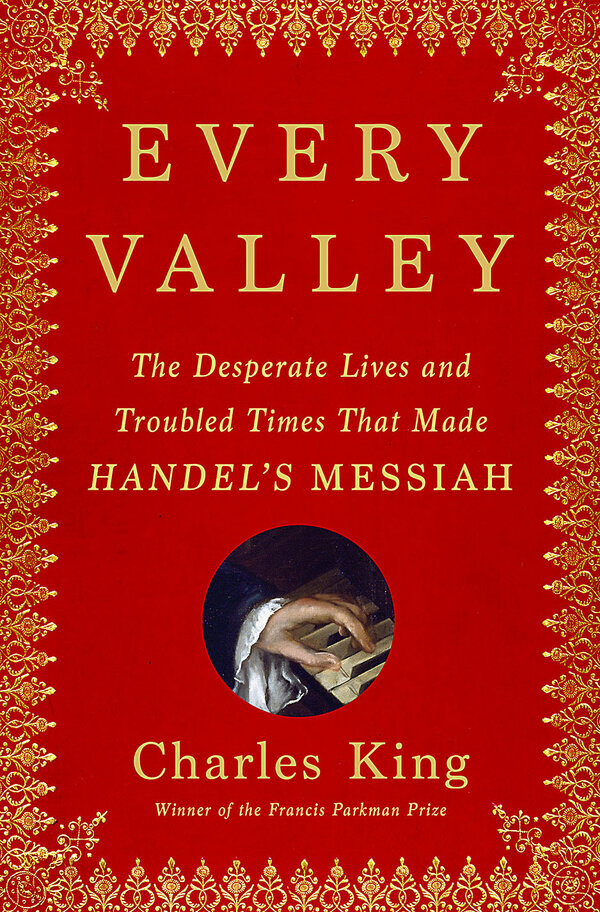How Handel brought ‘The Messiah’ to life in bleak times
Loading...
Time and place affect even the greatest works of art. The serendipitous composition of the music for George Frideric Handel’s most famous work has been told many times, but maybe never so engagingly as in “Every Valley: The Desperate Lives and Troubled Times That Made Handel’s ‘Messiah.’” Charles King masterfully interlocks the stories of the people and events that inspired and influenced the creation of Handel’s glorious “Messiah.”
The German-born composer first came to London in 1710 at the age of 25 but soon adopted England as his own, living and working there until the end of his long, productive life in 1759. While Handel is the star of “Every Valley” (the title comes from the oratorio’s first song, “Every Valley shall be exalted, and every Mountain and Hill made low, the Crooked straight, and the rough Places plain”), the supporting role played by the irascible librettist Charles Jennens, a wealthy political renegade, occasionally upstages him.
King appreciatively recounts the casualness with which Handel took on grand projects, including the libretto by Jennens, which in 1741 Handel had had in his possession for months before deciding, during an engagement in Dublin, to give it a whirl. Jennens, meanwhile, had no idea that Handel had, in a matter of about three weeks, fashioned the entire oratorio in his usual adroit way of recomposing airs from his own trove of Italian operas and bringing to life a bundle of new songs and choruses. Despite the patchwork libretto, Handel ingeniously parlayed Jennens’ quotations and paraphrases from the Old and New testaments into unexpected evocations of wonder and awe.
King neatly describes how the composer’s peculiar English may have helped him devise emphases in the lyrics that were, and remain, unusually striking: “For the biblical words ‘Hallelujah’ and ‘forever,’ he applied rhythms just enough at odds with English to be interesting.” Moreover, “For unto us a child is born,” clipped by Jennens from the book of Isaiah, Handel “repurposed” from a love duet he had written for an Italian opera, titled “No, I Will Never Trust You.”
The Irish audience for its premiere in April 1742, to Handel’s surprise and delight, was over the moon for “Messiah” (“The” in its title came later): “It seems to be a Species of Musick different from any other,” remarked a Protestant bishop.
As King lays out the contemporary cultural and political history, he corrects any misunderstanding that Handel’s Britain was a place of calm and national unity. It resembled, instead, the chaos and dread much of the world seems to be experiencing today, brought on by political upheavals and struggles to forge national identities. Britain was “defined by some combination of official Protestantism, naval power, a global empire, and most important not being French,” King writes. The government repressed religious dissent (in particular, Catholicism) while unconscionably investing in slavery and colonization.
Disease killed half of the infants born in London during the first half of the 18th century, as the lower classes of the country suffered terrible poverty. The popularity of “Messiah” grew in part because of its function as an annual charity fundraiser – given at Easter rather than at Christmas. Handel, a rich celebrity, seems to have donated his share of the oratorio’s proceeds to hospitals and orphanages.
Another of Handel’s good deeds was rescuing Susannah Cibber from an adultery scandal by casting her in “Messiah” and rewriting the aria “He was despised, rejected of men” in a range that she – not an especially accomplished singer – could perform well due to her extraordinary gifts as an actor. Her wrenching performances in Dublin brought her back to stardom on the London stage.
“Messiah” lay dormant for several years after its less-than-rapturous debut in London. But it was revived and became in Handel’s lifetime his most-performed work.
The pleasure of “Every Valley” may be a result of its veteran author having the theme of “hope” (“‘an expectation indulged with pleasure,’ as Samuel Johnson would describe it in his dictionary in the 1750s,” King notes). Hope, in the fall of 2020, amid the pandemic, was what spurred him to write the book: “Hemmed in, unprepared for what seemed like a dark future – disease, social division, a warming planet, the messed-up state of everything – I wanted desperately to find a way for us to slice through the gloom, to let in a bit of healing light.”
King has opened a dazzling skylight above Handel’s time.







